Your Thyroid - A Tiny Yet Powerful Gland
- Category: Health & Wellness, ENT
- Posted On:
- Written By: LVMC

It’s hard to imagine a tiny, butterfly-shaped gland being such a powerful force in our bodies. But the thyroid gland is just that – a critical link that controls many of the body’s major functions.
The thyroid gland is part of the endocrine system. It makes hormones that affect everything from our breathing and heart rate to digestion and temperature. The thyroid hormones are carried via the bloodstream to every tissue in your body.
What is the Thyroid Gland?
The thyroid is located in the lower front of your neck near the Adam’s apple area. It is about the size of two adult thumbs held together in a V-shape. The gland has two sides, or lobes, on either side of the windpipe. Often, the two sides are connected by a piece of tissue called the isthmus. Some people may have two distinct lobes that are not connected.
How does Thyroid Work?
The thyroid gland uses iodine found in foods to make two main hormones in your body:
- Triiodothyronine (T3)
- Thyroxine (T4)
The T3 and T4 hormones travel through the bloodstream and regulate the speed of cells or metabolism. If your T3 and T4 levels are either too low or too high, you may have several associated physical problems. A healthy thyroid will have T3 and T4 rates that are balanced. The hypothalamus and the pituitary help you maintain the balance of your T3 and T4. As your body functions, the hypothalamus produces TSH Releasing Hormone, or TRH. That tells your thyroid gland to produce more or less T3 or T4 as needed by increasing or decreasing how much thyroid-stimulating hormone or TSH is released.
Sometimes, your thyroid problems can cause changes to your weight, energy, digestion, and more. When the thyroid gland is not producing enough hormone, some body functions decrease. That is called Hypothyroidism. For others (about 1 in 100 people), an over-active thyroid is a problem. With hyperthyroidism, the gland produces too much hormone.
What are the symptoms of Thyroid Disorders?
With Hypothyroidism, people may experience:
 Fatigue
Fatigue
 Joint and muscle pain
Joint and muscle pain
 Depression
Depression
 Constipation
Constipation
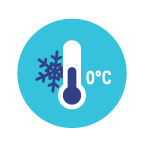 Sensitivity to cold
Sensitivity to cold
 Weight gain
Weight gain
 Slower heart rate
Slower heart rate
 Impaired memory
Impaired memory
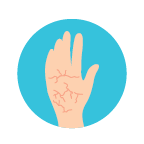 Dry Skin
Dry Skin
 Dry Hair
Dry Hair
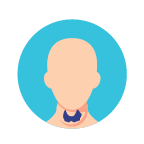 Enlarged Thyroid
Enlarged Thyroid
With Hyperthyroidism, people may experience:
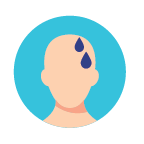 Sweating
Sweating
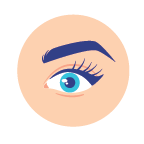 Bulging Eyes
Bulging Eyes
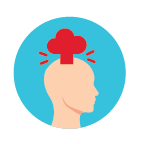 Irritability
Irritability
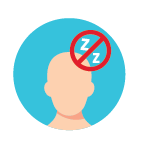 Difficulty Sleeping
Difficulty Sleeping
 Hair loss
Hair loss
 Weak muscles
Weak muscles
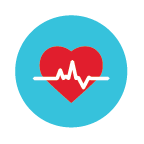 Rapid or irregular heartbeat
Rapid or irregular heartbeat
 Weight loss without trying
Weight loss without trying
 Dry skin and hair
Dry skin and hair
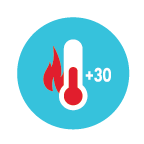 Heat sensitivity
Heat sensitivity
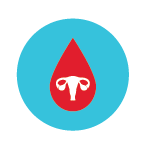 Menstrual cycle problems
Menstrual cycle problems
Problems with the thyroid can be caused by autoimmune disorders, such as Graves’ disease. Graves’ disease leads to an overactive thyroid, while a person with Hashimoto’s disease will have an under-active thyroid. Graves’ Disease is the most common form of hyperthyroidism. Sometimes, a person with Graves’ will have a swollen neck area denoting an enlarged thyroid gland. That is known as a goiter.
How are thyroid problems treated?
Usually, people with thyroid problems are treated by an endocrinologist. If hypothyroidism is the concern, it is often treated with a prescription medication called levothyroxine. Levothyroxine replaces a hormone produced naturally by the thyroid gland to regulate the body’s energy. For those with hyperthyroidism, there are several treatments. Depending on the approach decided upon by you and your physician, you may consider radioactive iodine or the use of anti-thyroid medications, such as methimazole or propylthiouracil.
Thyroid Cancer
In some cases, problems with the thyroid may mean cancer has developed. There are four types of thyroid cancer – papillary, follicular, medullary, and anaplastic. The most common is papillary. Thyroid cancer is the most common endocrine cancer. It is one of the fastest-growing cancers in the U.S., with an estimated 52,890 new cases in 2020. In the early stages, there are generally a few symptoms. As cancer develops, symptoms can include a lump or nodule in the front of the neck, a hoarse voice or difficulty swallowing, pain in the throat or neck, and swollen lymph nodes. Treatments for thyroid cancer can include surgery, radioactive iodine treatment, external beam radiation therapy, and chemotherapy. Some or all of the thyroid gland may be removed in surgery, with thyroid hormone replacement medications required following the surgery.
If you’re concerned you may have problems with your thyroid, do the simple “Check Your Neck” test:
- Look in a mirror at the front area of your neck, above your collarbone, and below your larynx.
- Tip your head back, sip some water and watch for changes or bulges in that area
- If you notice a bulge, call your physician. The bulge may be an indication of a thyroid nodule or enlarged thyroid.






.jpg)